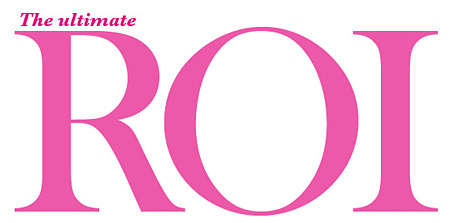
Armed
with passion, leadership training and no-nonsense business
models, these Kellogg School graduates are using their MBA
skills to fight poverty, sowing hope in the lives of millions
By
Matt Golosinski
Dream small
to dream big.
That's the paradox at the heart of business strategy employed
by Opportunity International, a microcredit lender
using sober-minded economics to heal a world wracked by poverty
and its attendant evils.
But
how, given some estimates that 40 percent of the world exists
on less than $750 a year, does one grapple with the enormity
of perhaps 3 billion impoverished people threatened by hunger,
illness and war?
Top-flight
management skills, along with compassion, are standing in
admirably well for Kellogg School alumni like Beth Houle
'95, senior vice president of marketing strategy at Opportunity
International and director of the pathbreaking organization's
Women's Opportunity Fund, a financial incubator. Proponents
of microfinance, an industry with informal roots dating back
ages but whose modern incarnation is not yet 40 years old,
contend that their approach to capitalism — making small
loans to entrepreneurs who lack collateral — offers
the best hope to rescue those who otherwise can expect little
else but a continued descent into squalor.
"Our
clients have been in that cycle of poverty: no access to capital,
slaves to money lenders and exorbitant rates," says Houle,
noting that Opportunity International was the first organization
of its kind, an ecumenical Christian venture founded in 1971
by Al Whittaker, former president of Bristol Meyers.
Today, she
and her peers, including chief financial officer Richard
John (TMP 1982), are proving that it really does take a
village, and about $84, the price of an average first-time "Trust
Bank" loan from Opportunity, to make a permanent mark in the
global battle against poverty. The
Trust Bank model builds community leaders and leverages communal
bonds by bringing together 15 to 40 local entrepreneurs —
overwhelmingly women — who are then connected by their
commercial enterprises, often small businesses that sell produce
or other goods. In this way, and simply by providing a safe
place for savings that otherwise could be stolen or would
have to be converted into livestock with a dubious future,
Opportunity extends First World business practices to redress
Third World calamity. Today, the organization serves some
800,000 people in 27 countries.
Opportunity,
and peers such as the Grameen Foundation and ACCION International,
rely upon the best management skills to align mission with
a viable strategy. Those who handle the business deftly are
attracting more resources, since donors, like investors, want
to put their money to work where the return proves greatest.
Under these
circumstances, Houle and other Kellogg School alums, such as
SERRV International's Sabrina Karl and Jean
Johnson, and Médecins Sans Frontières'
Jane Coyne, know the power their MBA training brings in
today's hypercompetitive market. Because
of this competition, differences between for-profit and nonprofit
management keep dwindling. Indeed, Oak Brook, Ill.-based Opportunity
International may have the soul of a nonprofit, but the nature
of its work demands that portions of it formally operate as
a for-profit bank, otherwise it could not legally hold its
clients' savings or access capital from commercial banks,
says Houle. "Most everyone in our organization came from some
private sector background," she says, including CFO John,
a Kellogg graduate with senior finance experience at Amoco.
Houle
wants Opportunity to be more than a top microfinance institution.
"I want it to be recognized as one of the top organizations
for poverty alleviation, period," she says. "I want to help
humanity, but the competitive part of me is focused on building
our business at the same time."
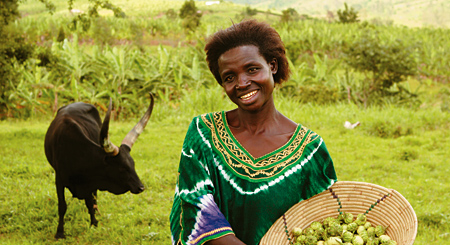 |
| Opportunity
International's loan clients include Beatrice Kitaara
of Mbarrara, Uganda, who with her husband now has a small
vegetable farm and one dairy cow, yielding enough income
to support their nine children. |
The
challenge of growing smart
According
to a 1999 Brookings Institution study, poverty eradication
works best when economic solutions are leveraged in conjunction
with a social fabric that offers education, healthcare and
housing. Microfinance
advocates say their efforts bring help in a tangible, immediate
way that can prove sustainable, and their ranks keep growing.
Accurate
numbers are hard to come by, but Indonesia by itself may host
some 600,000 such lenders. The United Nations Capital Development
Fund estimates that microfinance customers have increased
25 to 30 percent annually over the past five years. These
impressive gains still leave out a lot of people: Only 30
million of some 500 million households are being served. Among
the reasons for these numbers, according to a Nov. 5, 2005,
survey by The Economist, are barriers such as steep
and unpredictable inflation in most developing countries,
along with incompetent government and absent legal frameworks
to support financial services.
Stereotypes
about the poor's creditworthiness also bear part of the blame.
The reality, says Houle, is that many of her clients are fine
credit risks, particularly given her organization's use of
community ties to reinforce obligation. As evidence, she cites
a 98 percent repayment rate on Opportunity loans.
| |
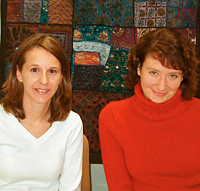 |
| |
SERRV
International's Sabrina Karl '02, left, and Jean Johnson
'99 |
| |
|
"Microfinance
is built on the truth that lacking capital is a business challenge;
it's not a character issue," she says. "Every businessperson
understands that, and it helps them understand entrepreneurs
who are poor."
Yet
scaling up presents serious challenges: Grow too big or attempt
too much too soon and mission drift can swamp the best intentions,
resulting in critical errors.
Houle's
organization remains focused, but it cannot afford to stand
still. She says that Opportunity continues its tradition of
innovation by enhancing products and services — including
drought insurance in Malawi, piloted last year with The World
Bank. She believes Opportunity's "tipping point" is coming
and that the organization, by leveraging its resources carefully,
can expand its efforts.
One
reason for Houle's optimism is the high loan repayment rate
and low arrears rate that allow money to continue working,
fueling other enterprises.
"In
addition to putting donations to good use, our local microfinance
banks can access same-currency loans from local commercial
banks — critical to stem currency risk — to then
lend to even more poor entrepreneurs," says Houle, who remembers
being introduced to the world of finance and philanthropy
as a child raising money for the Ronald McDonald House. "Our
microfinance banks, such as in Ghana, are among the first
recognized by their central bank."
As
an industry, "it's a brave new world ... the whole purpose
of which is to serve more poor people," she says.
Growth
challenges also face Karl and Johnson at SERRV International,
a Madison, Wis.-based nonprofit alternative trade and development
organization whose mission is to promote social and economic
justice and encourage sustainable environmental practices,
via a range of fairly traded goods. The group's catalog arm,
A Greater Gift, sells handcrafted products ranging from jewelry,
food and children's toys, to musical instruments and kitchenware.
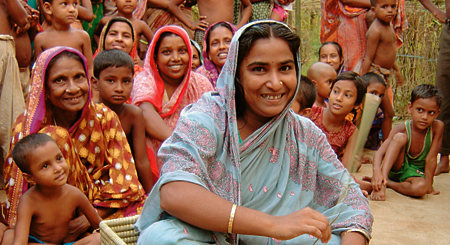 |
| Opposite:
Artists in rural Bangladesh cut Kaisa grass from riverbanks
to weave baskets for fair market trade through SERRV International. |
Founded
in 1949 and operating as a retailer and wholesaler, SERRV
works with a worldwide network of artisans and farmers in
some of the poorest regions in Africa, Asia and Latin America,
contracting them to produce items such as drums, tapestries
and tablecloths and small-batch, shade-grown coffee —
all traded at prices that let producers earn a living wage.
A
2002 graduate of the Kellogg part time program, Karl is director
of fund development for SERRV, "a dream job" that finds her
overseeing all of the organization's charitable giving and
socially responsible investment programs. About the organization's
SERRV International Loan Fund, she says, "You put the money
into SERRV just like you would a CD at the bank, and we pay
you interest while your principal funds our mission."
Her
Kellogg peer Johnson is SERRV's director of product development
and merchandising whose role entails cultivating relationships
aligned with the organization's mission.
"There
are lots of people with a product who don't have access to
the market," says Johnson '99. "We tend to work with organizations
that are training institutes or otherwise involved with the
community. Some of the groups support orphanages, provide
programs for young mothers or offer healthcare. This way,
the dollars that go toward a product purchase impact both
the artisans and their communities."
Today,
the organization is making special efforts in Africa, says
Johnson, whose entree into economic development came after
college and serving in Ecuador teaching English. "There was
such inequality of wealth I wanted to find a career helping
people in developing countries achieve some sort of economic
parity," she says.
Both
Kellogg grads are pleased with SERRV's recent growth —
an unexpected 17 percent jump in revenues last year —
but Karl describes this as a "wonderful challenge" that requires
their organization to grow quickly into its new size while
effectively handling the new operational stresses.
When
unanticipated demand results in a stock-out, SERRV relies
on customer engagement to retain the business. Sometimes the
situation even offers an opportunity to educate the consumer
about SERRV's global supply chain — the logistics of
which Karl says are complex since nearly all the organization's
merchandise comes from overseas producers.
Consequently,
SERRV finds itself managing a host of cross-cultural challenges
as it negotiates with nearly 90 producer groups in 35 countries.
Occasionally these challenges take improbable turns,
as when an artisan embellishes a standard design in an effort
to add value to the product. While well-meaning, the gesture
can create headaches for SERRV, whose customers expect an
item as described in the organization's catalog or on its
Web site.
"The
artisans see it as a gift to us — some extra carving
on the base of a drum, for instance," says Karl. "But we see
this as [a variation on] what our customers are expecting.
In America, it's actually better for the drum not to have
all those birds carved in the bottom. Challenges like that
are not uncommon for our product team."
SERRV
works closely with artisans to ensure product consistency
and to educate artisans about the American market. But it's
not only the producers who benefit from education, say the
Kellogg alums: They also try to inform Americans about the
value of fair trade — a term they define broadly to
include not only a living wage, but trade that is fair to
children, to the environment and to the artisans and farmers.
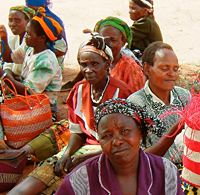 |
|
| Hand-woven
baskets and totes are among the goods offered by SERRV
International's African artisans. |
|
| |
|
Getting
through to more people is difficult, they admit, and one only
needs to look closer at the numbers to understand the challenge.
Despite that recent growth, SERRV's sales were about $8.5
million last year. Its peer in the fair trade movement, Ten
Thousand Villages, generated about $18 million in sales. By
comparison, annual sales from an individual Wal-Mart store
total about $65 million, says Karl, who has worked in the
nonprofit field since earning her undergraduate degree from
Michigan State in 1992.
Despite
this disparity, Johnson emphasizes the competitive nature
of their business.
"You
have to be competitive in general, but we have this whole
other layer of commitment and responsibility to our artisans,
our partners, which adds additional complexity to a business
that is already fairly complex for its size," she says.
Marketing
comes to the rescue
Like
any business, say these alums, their organizations must understand
and respond to customers. In doing so, they find their Kellogg
School marketing skills essential.
Houle
says Opportunity International applies best practices universally,
but local environments demand certain modifications. For example,
Eastern Europe's legacy of Soviet-era secret police squads
means that even today some people there find it difficult
to trust others in large groups. "They emerged from a regime
where people would turn them in," says Houle. So, in this
region Opportunity's Trust Bank model shrinks to accommodate
smaller groups before gradually scaling up and "building the
trust."
Learning
these customer dynamics takes about 3,000 loan officers worldwide
who are close to the local cultures. "This is really about
marketing," says Houle, who recalls the value of her Kellogg
School experience, particularly the Global
Initiatives in Management course that took her to India
for an academic project. "It's understanding a customer base
and its needs, including the unarticulated needs."
SERRV
understands these challenges, too, since geopolitics complicates
its mission. Karl and Johnson have to remain in touch with
both the First World end-users of their products as well as
their artisan clients who have extraordinary needs. In Tanzania,
for instance, they have begun working with a refugee group
from Burundi hoping to be repatriated to its homeland, a place
racked by civil war that many of the group's members have
not seen in a decade or more.
"They
have no ready cash and very few sources of income," says Johnson.
Through SERRV's sales of the refugees' baskets, plus a special
partnership with Lutheran World Relief, SERRV is helping stimulate
demand for these products, providing an infusion of cash to
facilitate the refugees' return to Burundi.
Keep
hope alive
These
complex and heartbreaking realities can even affect those
trying to help.
"Sometimes
I have this feeling, and it comes and goes, that this is hopeless,
that no matter how much we do, there's going to be a million
people who aren't being helped," admits Karl, who says her
Kellogg education has been one source of strength as she has
assumed professional leadership roles. Her philosophy of focusing
on individual lives that are being changed has kept her optimistic.
"Even if the system hasn't changed 20 years from now, there
are individuals whose time on this planet has been made better."
Johnson
agrees: "SERRV was created to foster social and economic justice,
and that's what we're doing. We focus on the message of hope
that creates opportunities where otherwise there may have
been none."
For
Houle, optimism springs from her organization's business model,
which she says has the ability to make a dollar work harder
over time.
"I
know our efficiencies, how we train our loan officers. I know
the power of this leverage," she says. "When we look at all
the factors, to help one poor person in Year One it costs
$10. Over 10 years, it costs $1 because the money keeps working."
Big
dreams don't come wrapped in paper more modest, but the results
conjure hope and an old tale about a few loaves and fishes
feeding a multitude. |



